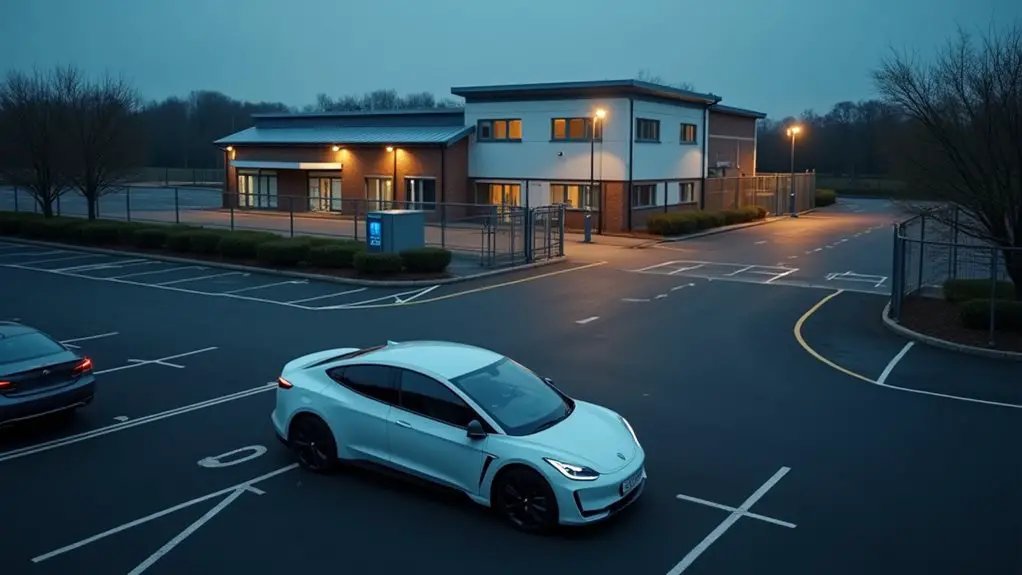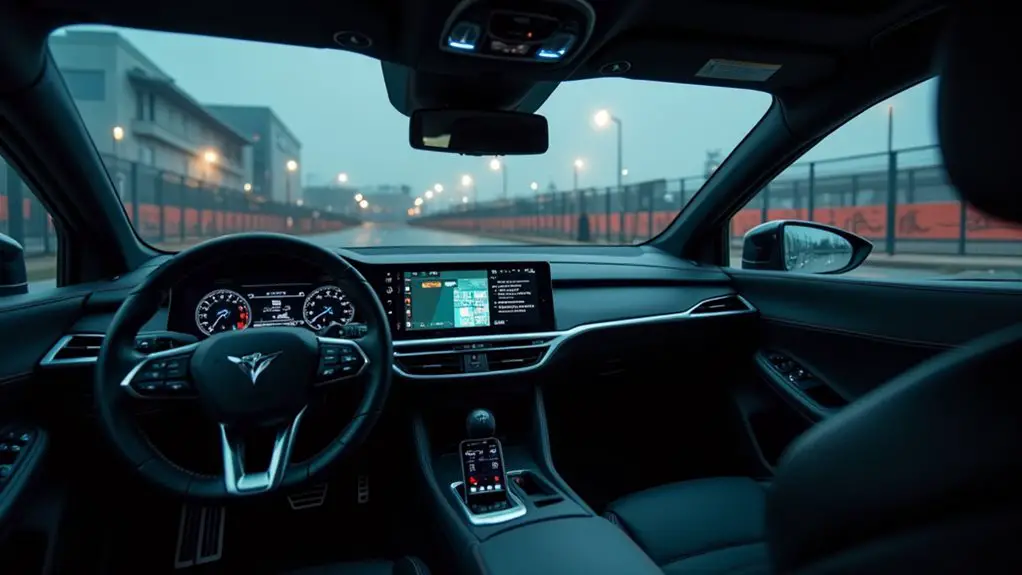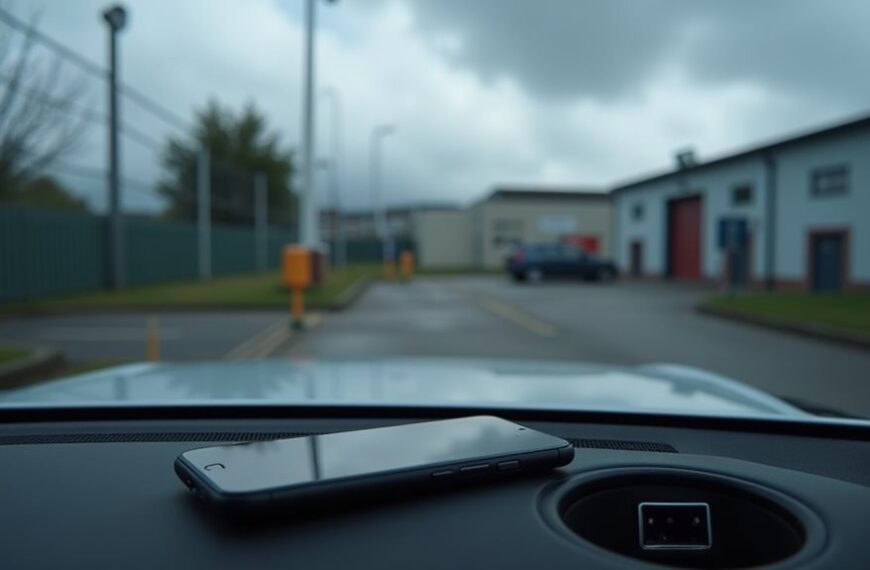Major UK defense contractors are instructing staff not to charge phones in Chinese-made electric vehicles due to security concerns. Companies like BAE Systems and Thales have implemented strict protocols, including two-mile buffer zones around sensitive facilities and prohibitions on Bluetooth connections. These precautions aim to prevent potential data exfiltration through the vehicles’ sensors and connectivity features. The restrictions stem from China’s 2017 National Intelligence Law that could compel companies to share collected data. Additional industry-wide security measures continue to evolve.

While Chinese electric vehicles gain popularity across Britain, major UK defense contractors are implementing strict security protocols to address potential surveillance risks. Companies including BAE Systems, Rolls-Royce, and Thales have instructed employees to avoid parking Chinese-linked cars near sensitive facilities, with a minimum two-mile buffer zone established at locations like RAF Wyton.
You’ll find these precautions extend beyond parking restrictions. Staff handling classified information are directed to refrain from discussing work-related topics inside such vehicles. The companies have prohibited both Bluetooth and wired phone connections to Chinese-made EVs, mirroring existing USB drive policies designed to prevent data breaches. The comparison between charging phones in Chinese cars and using unknown USB devices highlights the potential security vulnerabilities.
Modern electric vehicles come equipped with Lidar, cameras, and over-the-air update capabilities. These sensors could potentially capture location data, surroundings, and even audio information. Your phone becomes vulnerable when connected to these systems, as charging ports might extract contact lists or message histories. Experts warn that simple actions like Bluetooth pairing could lead to unauthorized data exfiltration from devices.
Defense industry leaders describe these measures as a “belt and braces” strategy. The cautious approach applies to contractors and employees dealing with sensitive information across the UK defense sector. Lockheed Martin and Raytheon have issued similar warnings to their workforce.
While the Ministry of Defence hasn’t imposed centralized restrictions, individual companies have moved forward with their own security advisories. The concern stems partly from China’s 2017 National Intelligence Law, which raises compliance issues regarding data collection and sharing.
You might be surprised to learn that over 25,000 Chinese vehicles are sold in the UK monthly as of March 2025. MG alone, owned by Chinese manufacturer SAIC, sold 16,000 units that month.
Defense firms have implemented physical separation protocols at production facilities and increased scrutiny of vehicle-to-cloud data transmissions. Employee education programs focus on connected car vulnerabilities, drawing parallels to Cold War-era signal intelligence protections.
Hybrid and petrol Chinese models remain permitted under current policies, though industry pressure mounts for standardized security frameworks as European markets face similar cybersecurity dilemmas.
Frequently Asked Questions
Which Chinese-Linked Car Brands Are Specifically Mentioned in the Warning?
The Chinese-linked car brands specifically mentioned in the warning include BYD, MG (owned by SAIC Group), Polestar (partially Chinese-owned), Great Wall Motors, and Omoda.
You’ll notice these brands are under scrutiny because they’re either produced entirely in China or have significant Chinese ownership.
BYD is noted as one of the top-performing Chinese brands in the UK, while MG vehicles, including electric models, have been acquired by the Chinese SAIC Group.
How Can Employees Safely Charge Phones While Commuting in These Vehicles?
You can safely charge your phone during commutes by using portable power banks instead of the vehicle’s USB ports.
Bring a high-quality power bank from a reputable manufacturer and charge it at home or work before your journey.
Consider wireless charging pads that operate independently from the car’s system.
Always use authentic charging accessories and keep your devices in airplane mode while charging to reduce data transmission risks.
Have Any Security Breaches Occurred From Charging Phones in Cars?
While no widely documented cases of security breaches specifically from charging phones in cars exist, security researchers have demonstrated vulnerabilities.
USB connections can enable data transfer alongside power, creating potential attack vectors. In 2019, researchers showed how compromised vehicle charging ports could inject malware into connected phones.
This risk increases with modern vehicles that have integrated systems connecting to navigation, communication networks, and personal devices.
What Specific Data Vulnerabilities Exist When Charging Phones in Vehicles?
When you charge your phone in a vehicle, several data vulnerabilities exist.
Your device can be exposed to:
- Data transfer risks through the USB connection, which can allow unauthorized access to your contacts, messages, and files
- Bluetooth network exploitation that captures information exchanged between your phone and the car
- Vehicle firmware that might log your device information and usage patterns
- Third-party apps connected to the car’s system that could access your personal data without proper permission
Do Personal Vehicles Owned by Defense Staff Face the Same Restrictions?
Yes, your personal vehicle faces restrictions if it contains Chinese components or technology.
Defense firms now issue warnings for Chinese-origin vehicles and advise against connecting your phones via Bluetooth or USB in these cars.
For certain Ministry of Defence sites, you’re required to park Chinese-linked vehicles at least two miles away from facilities.
You’re also advised to avoid work-related discussions inside Chinese-made cars due to potential data collection through sensors and microphones.





